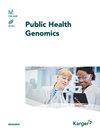将中国纳入国际个性化医疗联盟。关于可持续医疗保健中的个性化医疗的立场文件
IF 1.5
4区 医学
Q4 GENETICS & HEREDITY
引用次数: 0
摘要
在过去的十年中,个性化医疗(PM)的出现和传播已经定义了医疗保健领域的重大革命。原则上,医疗保健系统的可持续性受到研究和开发所需投资以及在常规临床护理中采用PM技术的挑战。欧盟资助的“将中国纳入国际个性化医疗联盟”(IC2PerMed)项目旨在将中国纳入“国际个性化医疗联盟”(ICPerMed)。IC2PerMed旨在协调欧盟和中国在该领域的研究议程,使欧盟和中国的方法能够迅速发展,并对欧盟和中国的合作产生强大的影响。方法:在本项目中,我们首先绘制了欧盟和中国关于PM的相关政策,然后我们让欧洲和中国的PM专家参加研讨会和德尔菲调查,以确定在可持续医疗中实施PM的相关优先事项。结果:在这一过程中,我们确定了9个总体优先事项,每个优先事项都涉及医疗系统可持续性和项目管理实施的具体方面,主要目标是支持政策制定者在欧盟和中国整合项目管理方法。讨论/结论从提高疾病诊断、治疗和预防的准确性以及减少药物使用效率低下造成的副作用来看,在卫生系统中实施PM具有吸引力。所需技术的研究、开发和实施需要时间和资源,这可能会减慢PM在医疗保健系统中的采用速度。我们确定的九个优先事项涉及一些最关键的问题,试图为全面的办法奠定基础。本文章由计算机程序翻译,如有差异,请以英文原文为准。
Integrating China in the International Consortium for Personalised Medicine. A position Paper on Personalised Medicine in Sustainable Healthcare
Introduction
Over the last decade, the emergence and spread of Personalised Medicine (PM) has defined a substantial revolution in healthcare. In principle, healthcare system sustainability is challenged by the investments required for research and development, as well as the adoption of PM techniques in routine clinical care. The “Integrating China in the International Consortium for Personalised Medicine” (IC2PerMed) EU-funded project aims to integrate China into the “International Consortium for Personalised Medicine” (ICPerMed). IC2PerMed aims to align the EU and China’s research agendas in this field to enable a swift development of approaches in the EU and China with strong leverage upon EU-Chinese collaborations.
Methods
Within this project, we firstly mapped relevant policies on PM in both the EU and China, then we involved European and Chinese experts in PM in workshops and Delphi Surveys in order to identify relevant priorities for the implementation of PM in sustainable healthcare.
Results
As a result of this process, we identified nine overarching priorities, each addressing specific aspects of the sustainability of healthcare systems and PM implementation, with the main goal of supporting policymakers in integrating PM approaches in the EU and China.
Discussion/conclusion
The implementation of PM in health systems is appealing in terms of improved accuracy in diagnostics, treatment and prevention of disease, as well as reduction of the side effects resulting from inefficient use of drugs. Research, development, and implementation of needed techniques require time and resources, that can slow the adoption of PM in healthcare systems. The nine priorities we identified address some of the most critical points, trying to lay the foundations for a comprehensive approach.
求助全文
通过发布文献求助,成功后即可免费获取论文全文。
去求助
来源期刊

Public Health Genomics
医学-公共卫生、环境卫生与职业卫生
CiteScore
2.90
自引率
0.00%
发文量
14
审稿时长
>12 weeks
期刊介绍:
''Public Health Genomics'' is the leading international journal focusing on the timely translation of genome-based knowledge and technologies into public health, health policies, and healthcare as a whole. This peer-reviewed journal is a bimonthly forum featuring original papers, reviews, short communications, and policy statements. It is supplemented by topic-specific issues providing a comprehensive, holistic and ''all-inclusive'' picture of the chosen subject. Multidisciplinary in scope, it combines theoretical and empirical work from a range of disciplines, notably public health, molecular and medical sciences, the humanities and social sciences. In so doing, it also takes into account rapid scientific advances from fields such as systems biology, microbiomics, epigenomics or information and communication technologies as well as the hight potential of ''big data'' for public health.
 求助内容:
求助内容: 应助结果提醒方式:
应助结果提醒方式:


